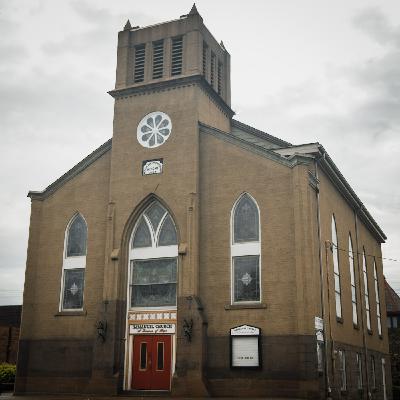Discover Immanuel Downtown
Immanuel Downtown

62 Episodes
Reverse
Jesus, before doing anything else, gathered people. Without people, there is not kingdom. If we are to follow the way of Jesus, we must also gather people.
Today we read and talk through the long list of names that Matthew places at the beginning of his Gospel. What does it all mean? Is it just a boring list, or is there more to it?
There's always more to it.
References/Sources
France, Richard T. The Gospel of Matthew. Grand Rapids, MI: Eerdmans, 2010.
Keener, Craig S. The Gospel of Matthew: A Socio-Rhetorical Commentary. Grand Rapids, MI: William B. Eerdmans Pub., 2009.
Nolland, John. The Gospel of Matthew: A Commentary on the Greek Text. Eerdmans, 2008.
NRSV Cultural Backgrounds Study Bible
Before we can start reading and attempting to understand what Matthew is saying in his gospel, we need to know what the context into which he wrote was and why he wrote it. Today, we spend some time laying the groundwork for an intense study of the Gospel According to Matthew.
References/Source
France, Richard T. The Gospel of Matthew. Grand Rapids, MI: Eerdmans, 2010.
Keener, Craig S. The Gospel of Matthew: A Socio-Rhetorical Commentary. Grand Rapids, MI: William B. Eerdmans Pub., 2009.
Nolland, John. The Gospel of Matthew: A Commentary on the Greek Text. Eerdmans, 2008.
NRSV Cultural Backgrounds Study Bible
This week, as we gathered for the 3rd week of Advent, Mike shared with us some thought on Joy.
Today we talk about what is sometimes called the Faith Candle or the Prophets Candle, but historically is known as the Repentance Candle. As we prepare ourselves for the coming of the Messiah, we MUST take time to reflect and rethink.
This week, Mike discusses Christian Hope and we try to re-orient our perspectives around a proper understanding thereof.
There are many benefits of finding time to disconnect from all the chaos that surrounds us. Today, we talk about some of them, including the reality that for many, it is in the quiet moments that we find the voice of God.
We've come to our discussion of prayer. As a discipline, this is arguably the most fundamental of them, but I hear all too often people who say they don't know how or what to pray. Today we tackle these issues. Nex week, we'll be discussing the listening side of prayer.
Largely a lost and forgotten discipline, fasting is in fact an crucial and expected part of the Christian life. Today we talk about what it is and it is to be used.
How to view "our" stuff? Is it even ours? What are we supposed to do with it?
Today we talk about living into our calling as servants.
Worship is more than just singing on Sunday. It's a way of life into which we must learn to step.
At the root of becoming a follower of Jesus (a disciple) is the need to learn the stories of our faith. Today, we take time to look at the variety of ways we can do that.
How do you actually go about sharing the story of God and how he has impacted your life? For many of us, this is a major obstacle in fulfilling the Great Commission. Today, we talk about one way to do exactly that.
If Evangelization is the process of initiating people into the discipleship process (it is), what does that process look like?
Over the last 2,000 years the Great Commission has been understood and followed in a variety of ways. Today, we're talking about how we ought to think about it and follow the instruction.
We take a look at all of the major theories and ideas about what Jesus accomplished on the cross and make the argument that we need them all in order to have a full picture of what happened.
Research sources:
Bird, Michael F. , What Christians ought to Believe
Bird, Michael F. , Evangelical Theology
Gonzalez, Justo L., Concise History of Christian Doctrine
Myers, Ben, The Apostle's Creed: A Guide to the Ancient Catechism
Wright, N.T.; The Day the Revolution Began
In this discussion, we talk about Jesus's life of suffering and how it ought to inform every aspect of our lives.
We discuss the orthodox belief that Jesus was both fully divine and fully human.
Today we deal with the doctrine of creation and how it stood (and stands) in opposition to the many competing religions and narratives of the world. We delve into the problem of evil that we see around us, which was the problem many of these other ideas sought to explain, and how the early Christians dealt with it.
Research sources:
Bird, Michael F. , What Christians ought to Believe
Gonzalez, Justo L., Concise History of Christian Doctrine
Myers, Ben, The Apostle's Creed: A Guide to the Ancient Catechism





